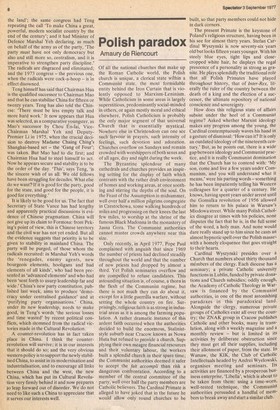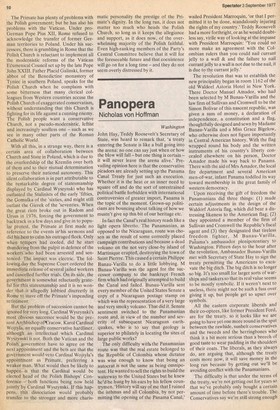Polish paradox
Amaury de Riencourt
Of all the national churches that make up the Roman Catholic world, the Polish church is unique, a clerical state wain a Communist state, the most formidable entity behind the Iron Curtain that is violently opposed to Marxism-Leninism. While Catholicism in some areas is largely superstitious, predominantly social-minded in others, or again mostly moral and ethical elsewhere, Polish Catholicism is probably the only major segment of that universal Church that is essentially mystical. Nowhere else in Christendom can one see such fervour in prayers, such intensity of feelings, such devotion and adoration. Churches overflow on Sundays and remain crowded with worshippers of,both sexes and of all ages, day and night during the week.
The Byzantine splendour of many cathedrals and churches provides an inspiring setting for the display of faith which contrasts with the rather drab environment of homes and working areas, at once soothing and stirring the depths of the soul. On the Feast of the Assumption in midsummer, well over half a million pilgrims congregate in Czestochowa, some walking hundreds of miles and progressing on their knees the last few miles, to worship at the shrine of the famous Black Madonna in the monastery of Jasna Gora. The Communist authorities cannot muster crowds anywhere near this size.
Only recently, in April 1977, Pope Paul complained with anguish that since 1969 the number of priests had declined steadily throughout the world and that the number of new priests had ,dropped by almost a third. Yet Polish seminaries overflow and are compelled to refuse candidates. This astounding situation is, of course, a thorn in the flesh of the Communist regime, but there is not much they can do about it, except for a little guerrilla warfare, without setting the whole country on fire. Surprisingly, religious faith is as strong in industrial areas as it is among the farming population. A rather dramatic instance of this ardent faith occurred when the authorities decided to build the enormous, Staliniststyle suburb near Cracow known as Nowa Huta but refused to provide a church. Supplying their own meagre financial resources and their voluntary labour, the workers built a splendid church in their spare time; the Communist authorities deemed it safer to accept the fait accompli than risk a dangerous confrontation. According to a member of the central committee of the party, well over half the party members are Catholic believers. The Cardinal Primate is alleged to have joked that in the future he would allow only round churches to be built, so that party members could not hide in dark corners.
The present Primate is the keystone of Poland's religious structure, having been in his see for almost thirty years. Stefan Cardinal Wyszynski is now seventy-six years old but looks fifteen years younger. With his steely blue eyes, tight lips and closecropped white hair, he displays the regal prescence of a personality as strong as granite. He plays splendidly the traditional role that all Polish Primates have played throughout history, that of Inter-Rex, literally the ruler of the country between the death of a king and the election of a successor, the ultimate repository of national conscience and sovereignty. How does this religious state of affairs subsist under the heel of a Communist regime? Asked whether Marxist ideology makes any progress among the young, the Cardinal contemptuously waves his hand in a gesture of dismissal: 'How can it? It is only an outdated ideology of the nineteenth century.' But, as he points out, there is a wide gap between ideology and Communist practice, and it is really Communist domination that the Church has to contend with: 'My son, come and live a few years under Communism, and you will understand what it means,' were his parting words — something he has been impatiently telling his Western colleagues for a quarter of a century. He knows, having spent years under arrest until the Gomulka revolution of 1956 allowed him to return to his palace in Warsaw's Miodowa street. While many Polish Catholics disagree at times with his policies, none disputes the fact that he is, in the full sense of the word, a holy man. And none would dare really stand up to him since he casts an almost hypnotic spell over the Polish masses with a homely eloquence that goes straight to their hearts, Cardinal Wyszynski presides over a Church that numbers about thirty thousand members of the clergy. Each diocese has a seminary; a private Catholic university functions in Lublin, funded by private donations and Church subsidies; oddly enough, the Academy of Catholic Theology in Warsaw is financed by the Communist authorities, in one of the most astonishing paradoxes in this paradoxical land. Alongside the clergy, numerous private groups of Catholics exist all over the country; the ZNAK group in Cracow publishes Catholic and other books, many in translation, along with a weekly magazine and a monthly review — but is limited in its activities by deliberate obstruction since they must get all their supplies, including their allotment of paper, from the state. In Warsaw, the KIK, the Club of Catholic Intellectuals headed by Andrei Wyelowskl, organises meeting and seminars. Its activities are financed by a prosperous bus iness enterprise, which is about to be taken from them: using a time-worn, well-tested technique, the Communist authorities persuaded a handful of memhers to break away and start a similar club. The Primate has plenty of problems with the Polish government; but he has also his problems with the Vatican. Under proGerman Pope Pius XII, Rome refused to acknowledge the transfer of former German territories to Poland. Under his successors, there is grumbling in Rome that the Polish Church is reluctant to implement all the modernistic reforms of the Vatican Ecumenical Council set up by the late Pope John XXIII. Father Placid Galinski, former abbot of the Benedictine monastery of Tyniec in southern Poland, speaks for the Polish Church when he complains with some bitterness that many clerical colleagues from Western countries accuse the Polish Church of exaggerated conservatism, without understanding that this Church is fighting for its life against a cunning enemy. The Polish people want a conservative Church, not a pseudo-modernistic, leftist and increasingly soulless one — such as we see in many other parts of the Roman Catholic World.
With all this, in a strange way, there is a certain area of collaboration between Church and State in Poland, which is due to the overlordship of the Kremlin over both of them and to their Mutual determination to preserve their national autonomy. This silent collaboration is in part attributable to the remarkable degree of statesmanship displayed by Cardinal Wyszynski who has outlasted the Stalinists of the early 'fifties, the comulka of the 'sixties, and might still outlast the' Gierck of the 'seventies. When the great riots broke out in Radom and Ursus in 1976, forcing the government to backtrack in a few days and give in to popular protest, the Primate at first made no reference to the events in' his sermons and did his best to calm his outraged flock. Only when tempers had cooled, did he start thundering from the pulpit in defence of the workers who had been arrested and sentenced. The impact was electric. The following day the Supreme Court ordered the immediate release of several jailed workers and cancelled further trials. On its side, the government is somewhat reluctantly grateful for this statesmanship and it is no wonder that it allegedly lobbied discreetly in Rome to stave off the Primate's impending retirement.
But the problem of succession cannot be ignored for very long. Cardinal Wyszynski's most obvious successor would be the present Archbishop ofrracow, Karol Cardinal Wojtyla, an equally conservative hardliner, although an intellectual which Cardinal Wyszynski is not. Both the Vatican and the Polish government have to agree on the next appointment and the bets are that the government would veto Cardinal Wojtyla's appointment as Primate, preferring a weaker man. What would then be likely to happen is that the Cardinal would be elected head of the Polish Bishops' Con ference — both functions being now held jointly by Cardinal Wyszynski. If this hap pens, this dissociation would probably transfer to the stronger and more charis matic personality the prestige of the Primate's dignity. In the long run, it does not matter too much who heads the Polish Church, so long as it keeps the allegiance and support, as it does now, of the overwhelming majority of the Polish faithful. Even high-ranking members of the Party's Central Committee believe that it will for the foreseeable future and that coexistence will go on for a long time — and they do not seem overly distressed by it.































 Previous page
Previous page